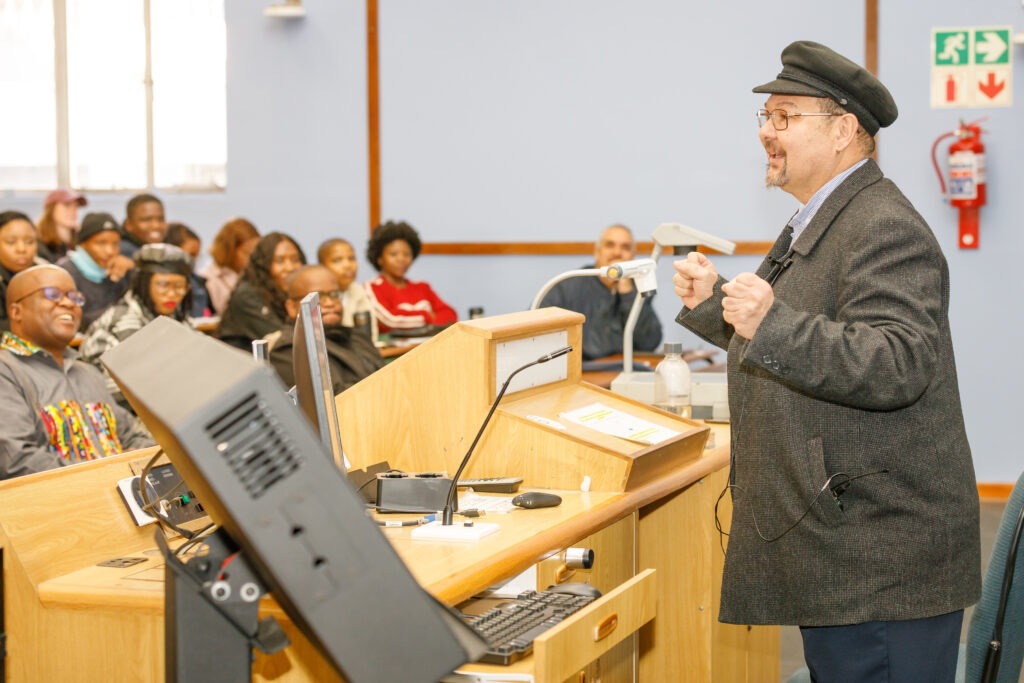
James Kruger, a Director of Health in the Western Cape, giving his talk at the Africa Centre for Inclusive Health Management (Africa Centre) 2025 PgDip Winter School.
There is too much reliance on foreign aid and international donors when it comes to providing and implementing healthcare in South Africa, James Kruger, a Director of Health in the Western Cape said during a fascinating talk at the Africa Centre for Inclusive Health Management (Africa Centre) 2025 PgDip Winter School.
James Kruger, a Senior Director for Community Participation in the Western Cape Provincial Department of Health, delivered a compelling message to audience members at the PgDip Africa Centre 2025 Winter School: South Africa must reduce its reliance on foreign aid to build a more sustainable, community-driven healthcare system. “We make massive mistakes when we don’t try to be sustainable and allow donors to lead us, instead of us leading them.”
Kruger has over 25 years of experience in public service, leading programmes in district health, public health and foundational laboratory experience. He has a strong background in activism and trade unions and a passion for working class people and communities in under-serviced areas.
He argued that the South African government has the capacity to do more. “Our government has tools and with better governance, we have more than enough money. We have integrated systems to engage communities more effectively and we can do so much better if we target prevention activities and improve healthcare outcomes in communities.”
Mr Kruger’s talk was entitled: Beyond Tokenism: Meaningful Community Engagement for Inclusive Health Systems and focused mainly on how better community engagement, particularly among the poor and working-class populations in South Africa could improve health outcomes. He emphasised that many decision-makers fail to grasp the realities faced by local communities – such as living in informal settlements, joblessness, and lack of access to health insurance.”
At the same time, not enough was done to involve community members in projects that affected them in their own areas, mentioning the example of new hospitals being built in Belhar on the Cape Flats, and the level of consultation with local community members these facilities were meant to serve. He shared stories of how people had approached him to ask why they weren’t consulted to provide particular services that would have created jobs and income for community members. Involving local businesspeople could help with community ownership and management of such enterprises in areas.
Kruger acknowledged that it was not always easy to know which organisation or community forum needed to be consulted and how to involve them. He said government officials often simply didn’t know how to engage with community members and this was part of the problem. The crux of the matter was building better relationships.
Going forward, communities needed to be involved especially when it came to preventative work in communities. This would help lift the burden on hospitals and improve health outcomes.
He added strong primary healthcare platforms with integrated community platforms could go a long way to improve health outcomes in communities. By improving access to essential health services around maternal health, HIV/Aids testing and counselling and awareness of HIV pre-exposure prophylaxis (PrEP), many of the country’s biggest health challenges could be addressed very powerfully.
To all those planning health programmes and initiatives and hoping for good outcomes, Kruger had some words of advice. “Is there a community member in the room when the decisions are made? Are you collaborating effectively with the community members who have the most at stake?” He concluded his talk by saying meaningful community engagement was not easy but it was essential.
